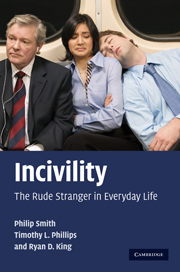Book contents
- Frontmatter
- Contents
- List of figures and tables
- Preface and acknowledgements
- 1 Redirecting incivility research
- 2 The fundamentals of the incivil encounter
- 3 Everyday incivility and the everyday round
- 4 Emotions and sequences
- 5 Gender, age and class: divergent experiences?
- 6 After the event: coping, avoiding and changing
- 7 General attitudes towards the stranger: exploring fear and trust
- 8 How to confront incivility
- 9 Twenty questions and answers
- References
- Index
5 - Gender, age and class: divergent experiences?
Published online by Cambridge University Press: 05 June 2012
- Frontmatter
- Contents
- List of figures and tables
- Preface and acknowledgements
- 1 Redirecting incivility research
- 2 The fundamentals of the incivil encounter
- 3 Everyday incivility and the everyday round
- 4 Emotions and sequences
- 5 Gender, age and class: divergent experiences?
- 6 After the event: coping, avoiding and changing
- 7 General attitudes towards the stranger: exploring fear and trust
- 8 How to confront incivility
- 9 Twenty questions and answers
- References
- Index
Summary
Our analyses so far in this book have concerned ‘people in general’. We have focused for the most part on outlining the features of events and their aftermath as they impact upon the woman or man in the street. Once or twice we have noted that victims with certain social or demographic characteristics have divergent experiences from the average, but we have not given sustained attention to the ways that categorical identities might shape the distribution and interpretation of victimizations. In this chapter we move the analytic spotlight onto three socio-demographic background variables: gender; age; and class.
In the backlash against universalism, a major theme in postmodern and poststructural social theory has been the claim that the experience of life is radically shaped through identity. The argument goes that when thinkers talk about generic human experience they are usually talking about or projecting the worldview of the affluent white male. General statements cloaked particular experiences. Goffman himself became prey to such critique, the case being made that he drew large conclusions from his own impressions of walking down the street. His observations about the subtleties of eye contact, the averted gaze and interpersonal space in public reflected his reality. For Goffman these behaviours were all about tact and mutual respect. The case was made that for women such body management in public might be about avoiding sexual harassment; for persons of colour the issue might be to dodge racism or to appear non-threatening.
- Type
- Chapter
- Information
- IncivilityThe Rude Stranger in Everyday Life, pp. 83 - 104Publisher: Cambridge University PressPrint publication year: 2010



